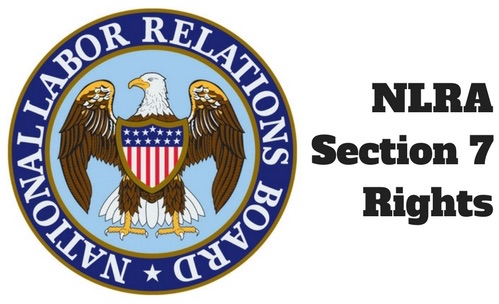The National Labor Relations Act (NLRA) Section 7 applies to both union and nonunion employers; it guarantees employees the right not only to bargain collectively, organize, form, join, or assist labor organizations, but also the right to engage in “other concerted activities” for the purpose of collective bargaining or other mutual aid and protection. Section 8 of the Act then makes it an unfair labor practice for an employer to “interfere with, restrain, or coerce” employees in their exercise of these rights.
Section 7 grants employees the right to communicate about wages, hours, and any other terms and conditions of employment. This communication may occur among coworkers at the company locations or with other third parties on social media.
When reviewing employer policies and practices for compliance with the Act, the NLRB determines whether a rule would have a “chilling effect” on employees’ Section 7 activity. The Board determines whether employees would reasonably construe the policy to prohibit or restrict their activity. Consequently, the NLRB’s broad interpretation of Section 7 rights has placed all sorts of employer policies under scrutiny.
These policies include those that address or restrict:
- Confidentiality
- Employee conduct toward the company and/or supervisors
- Employee conduct toward other employees
- Communication or interactions with third parties, including the media and government agencies
- Protection of employer logos, copyrights, and trademarks
- Photography and recording
- When employees may leave work
- Conflicts of interest.
- At Will Statements
- Arbitration
- English-only rules
NLRB Guidance for Employers regarding Workplace Conduct Rules
Employers should re-review their company handbooks to ensure that it complies. The Board found the following language to be unlawful because it was overly broad and may have a “chilling effect”:
- “Be respectful to the company, other employees, customers, partners, and competitors.”
- “Do not make fun of, denigrate, or defame your coworkers, customers, franchisees, suppliers, the Company, or our competitors.”
- “Be respectful of others and the Company.”
- No “defamatory, libelous, slanderous, or discriminatory comments about [the Company], its customers and/or competitors, its employees or management.”
- “Refrain from any action that would harm persons or property or cause damage to the Company’s business or reputation.”
- “[I]t is important that employees practice caution and discretion when posting content [on social media] that could affect [the Employer’s] business operation or reputation.”
- Do not make statements “that damage the company or the company’s reputation or that disrupt or damage the company’s business relationships.”
- “Never engage in behavior that would undermine the reputation of [the Employer], your peers or yourself.”
Below is suggested employer handbook language:
Confidentiality
- Unlawful: Do not discuss customer or employee information outside work, including phone numbers and addresses.
- Unlawful: Discuss work matters only with other employees who have a specific business reason to know or have access to such information. Do not discuss work matters in public places.
- Lawful: Do not disclose confidential financial data or other nonpublic proprietary company information. Do not share confidential information regarding business partners, vendors, or customers.
Conduct toward employer
- Unlawful: Defamatory, libelous, slanderous, or discriminatory comments about the company, its customers and/or competitors, employees, or management will not be tolerated.
- Unlawful: Employees may not engage in disrespectful conduct or insubordination, including, but not limited to, refusing to follow orders from a supervisor or a designated representative.
- Lawful: Each employee is expected to work in a cooperative manner with management/supervisors, coworkers, customers, and vendors.
- Lawful: Employees will not be discourteous or disrespectful to a customer or any member of the public in the course and scope of company business.
Employee conduct
- Unlawful: Do not send unwanted, offensive, or inappropriate e- mails.
- Lawful: Threatening, intimidating, coercing, or otherwise interfering with the job performance of fellow employees or visitors is prohibited.
Logos, copyrights, trademarks
- Unlawful: Do not use any company logos, trademarks, graphics, or advertising materials on social media.
- Lawful: Respect all copyright and other intellectual property laws. For the employer’s protection as well as your own, it is critical that you show proper respect for the laws governing copyrights, fair use of copyrighted material owned by others, trademarks, and other intellectual property, including the employer’s own copyrights, trademarks, and brands.
Restrictions on leaving work
- Unlawful: Walking off the job is prohibited.
- Lawful: Walking off a shift, failing to report for a scheduled shift, and leaving early without supervisor permission are grounds for immediate termination.
Re: New NLRB Handbook Guidelines—Do You Need to Reword Your Policies? Evans, W.J. (December 1, 2017): Alaska Employment Law Letter

